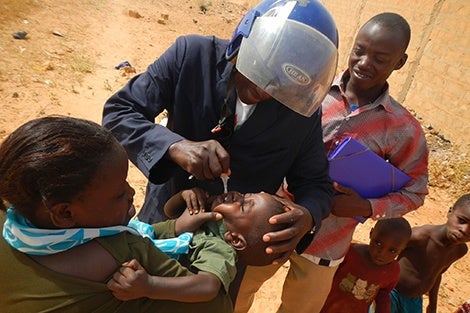For immediate release: Wednesday, March 22, 2017
Boston, MA – A new vaccine for rotavirus was found to be 66.7% effective in preventing severe gastroenteritis caused by the virus, according to a new study from researchers at Harvard T.H. Chan School of Public Health and Epicentre, Paris. Rotavirus is responsible for about 37% of deaths from diarrhea among children younger than 5 years of age each year, or about 450,000 children, with a disproportionate effect in sub-Saharan Africa.
The study was published in the March 23, 2017 issue of the New England Journal of Medicine.
Rotavirus is the leading cause of acute diarrhea, or severe gastroenteritis, in children. Unlike other causes of diarrhea, improvements in water, sanitation, and hygiene do not prevent rotavirus transmission, therefore vaccination is essential to prevent death and complications from childhood diarrhea.
To make a difference in countries where the rotavirus burden is highest and access to health care is low, vaccines need to be affordable, as well as safe, effective, and heat-stable. Currently there are two rotavirus vaccines, but they are expensive and refrigeration must be maintained throughout the supply chain. In resource-poor countries such as Niger, electricity and refrigeration are often unreliable. The new vaccine is heat-stable, the first of its kind for rotavirus prevention.
“This trial brings a vaccine which is adapted to African settings to those who need it most,” said first author Sheila Isanaka, assistant professor of nutrition at Harvard Chan School. “When the vaccine becomes widely available in Africa, it will help protect millions of the most vulnerable children.”
For the trial, researchers conducted a randomized, placebo-controlled trial in Niger to evaluate the efficacy of BRV-PV, a low-cost, heat-stable vaccine manufactured by Serum Institute of India Pvt Ltd. The researchers recruited 3,508 healthy infants to receive three doses of the vaccine or placebo at 6, 10, and 14 weeks of age. All children included in the trial are monitored in local health centers and receive free health care for two years.
The vaccine has been licensed in India, but approval—known as prequalification—by the World Health Organization is needed before it can be purchased by the United Nations and government agencies. “After the successful clinical trial of this new vaccine, we hope that it can be made available as soon as possible to children in Niger and across Africa,” Isanaka said.
The study was supported by Médecins Sans Frontières Operational Center in Geneva and the Kavli Foundation. Epicentre receives core funding from Médecins Sans Frontières.
“Efficacy of a Low-Cost, Heat-Stable Oral Rotavirus Vaccine in Niger,” Sheila Isanaka, Ousmane Guindo, Celine Langendorf, Amadou Matar Seck, Brian D. Plikaytis, Nathan Sayinzoga-Makombe, Monica M. McNeal, Nicole Meyer, Eric Adehossi, Ali Djibo, Bruno Jochum, and Rebecca F. Grais, New England Journal of Medicine, March 23, 2017, doi: 10.1056/NEJMoa1609462
Visit the Harvard Chan School website for the latest news, press releases, and multimedia offerings.
For more information:
Todd Datz
tdatz@hsph.harvard.edu
617.432.8413
photo: McKenzie Andre, CDC
###
Harvard T.H. Chan School of Public Health brings together dedicated experts from many disciplines to educate new generations of global health leaders and produce powerful ideas that improve the lives and health of people everywhere. As a community of leading scientists, educators, and students, we work together to take innovative ideas from the laboratory to people’s lives—not only making scientific breakthroughs, but also working to change individual behaviors, public policies, and health care practices. Each year, more than 400 faculty members at Harvard Chan School teach 1,000-plus full-time students from around the world and train thousands more through online and executive education courses. Founded in 1913 as the Harvard-MIT School of Health Officers, the School is recognized as America’s oldest professional training program in public health.
